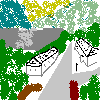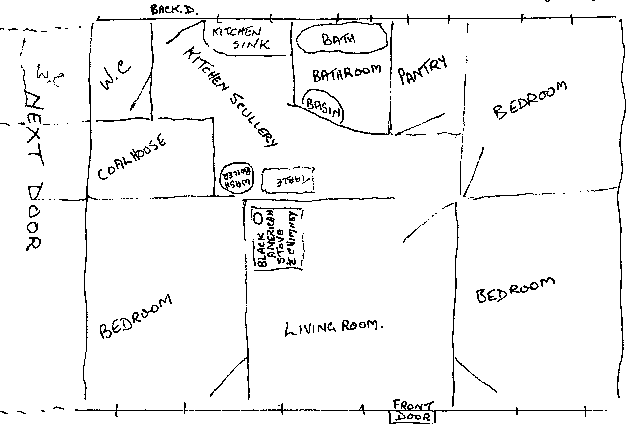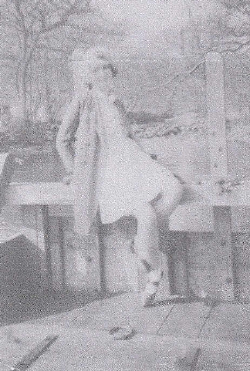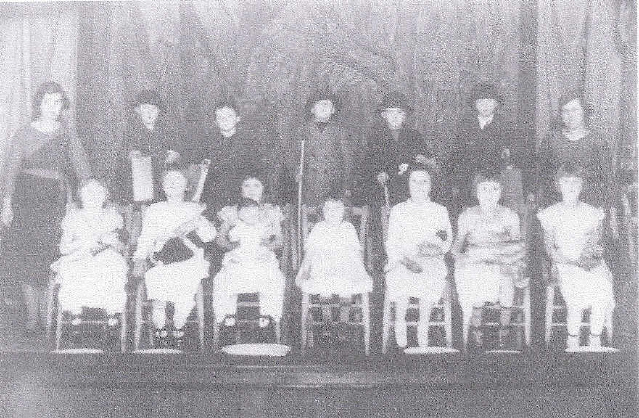
|
Burnbanks Project
Examples: |
Burnbanks project
| Testimony from Mrs Mairghread Morag Sharp-MacColl |
All material is the copyright of the provider or BDLHS; please do not copy without permission. Contact us by email on "burnbanks at bampton-history.org.uk" for more information.
Early in 1933. About February
All over the country, men were walking the roads without enough to eat looking for work. Grown men were begging for sixpennies outside every Hotel and railway station.Dad was worried; he did not want to sign on for the dole and he was desperate for a place. Then he got talking to a man who told him there was a chance of a job in the Mardale valley five miles over the hills.
This was where the reservoir was to be built to collect the drinking water from the surrounding hills to send through the tunnel to Manchester. Dad was told it was a good rough five miles from Longsledale to Mardale but if he went round by road through Shap it was easily 20 miles. We had no money for a bus fare and there was no direct bus service anyway so Dad said that he would walk it himself.
He finished work on the Friday night. He wore his old felt hat, an army great coat and some old waterproof leggings. He had a bad limp and he was tired out but he was game. He walked all day Saturday and by evening he was soaked right through to the skin and lost somewhere up near High Street Mountain. He told us later that he just gave up when he saw a light at a farmhouse down in a valley and more by good luck than anything he scrambled down and staggered up to the door. Fortunately the farmer's wife was a kindly soul and she took him in and dried him off and gave him a meal. He was given a lift in a cart down the valley while he slept and he presented himself to the Foreman Manager Mr. Johnson and asked for a job on the Sunday morning. Mr. Johnson was a Scotsman and he said "Any man who would walk over the mountains for a job damn well deserves one". However he could only put him on digging foundations in the hole at the bottom of the works to start with. They were not supposed to take anyone on for other work until the whole dam work was started in several weeks time. So for weeks Dad worked with a pick and shovel with all the Navvies. Then he was put to work in the power station and Mum and I were sent for in a lorry and all our bits and pieces were brought to the village of Burnbanks, to live at No 5.

Plan of the MacColl's house at Burnbanks
The Village
Burnbanks was a collection of 65 houses built by the Manchester Corporation Water Works to accommodate the workers who built the reservoir, or dam across the northern end of the Mardale. The drinking water it gained was for use of several large towns and the city of Manchester two hundred miles south and this water was to be carried through the tunnel with a pipeline which was just about complete, blasted out much of the way through solid rock.The Water Board Authority did have difficulty with Rural Beauty conservationists and mainly the local landowners like Lord Lonsdale. The board had to sign an agreement to be responsible for the protection of wildlife. All hunting and shooting rights were denied the Authority and any worker in the village caught fishing or poaching anything off land, air or river was instantly dismissed.
Unfortunately when the village was completed in 1928 at the same time as the tunnels were nearly finished, the big depression hit the whole country and funds were supposed to have dried up so all work on the Dam closed down.
All over Britain men were being sacked; being put out of work was quite normal.
The Management committee for this project had to let many workers go but it was agreed that men who had already settled in the village with wives and children should stay and they would be allowed one weeks work in three so that they would not starve. Only unmarried men were sacked but promised that if work started up again they would be employed if they could return someday.
They went walking with their packs on their backs, like hundreds of others.
Just before the closedown of the work on the tunnel at the south end of Mardale there was a dreadful accident. An explosive charge packed wrongly caused a tunnel cave in and one man was killed, three were partly blinded and several had injuries that made it impossible for them to work properly again.
One of the man who was killed had two children, one boy and one girl. The boy was still at school in Penrith Grammar but the girl was given the management of the little shop at the far end of the village, which sold sweets, cigarettes and newspapers. She was called Rosie and she stayed in her little shop for the next seven years, the mother kept her house - No 8 it was (Mrs. Cuthell).
The shop was quite a little gossip centre, all the men bought their newspapers on the way to work, also their Willie Woodbines. The Bus came from Penrith three times a day 8:00am, 10:00am, 2:00pm and on Saturdays 5:00pm and 10:00pm. The bus would wait 10 minutes before going back to Penrith. School children went to school at Bampton, at least 20 of them went on the 8:00am bus - the best part of childhood. To me it was magical, wonderful - at times very frightening but the most fascinating part too.
We had come to live in No 5 in February 1933. My Mother was in very poor health, all the long hours of work at Mirthwait had taken it out of her with the stress of 2 years. Also during the last two years I had been very ill which was a terrible worry for her as many children died in those days - Bronchial pneumonia following simple infections every year. I suppose I had to come to terms with not being able to play for weeks at a time, recovering slowly from one illness only to become ill with another (Diphtheria, measles and T. B. Gland in the neck).
I could not start school at five and I had developed a very real dislike of Drs. They stopped you from running about walking and jumping for too long. I also hated going to bed, having spent so much of my short life there already, but I learned that there was no use fighting or making an argument. The best and easiest thing to do was to curl up small and quiet and listen to what went on and remember events and incidents as they happened, or stories and gossip told by the adults.
I grew to love Burnbanks. As I grew older whenever I was alone or frightened or in pain I would go over all these memories - like a very personal photo album or diary before I could write. Burnbanks is no longer there. I cannot go back to it as it was. A little like the poem that my Mother used to say to us at bedtime:
The way through the woods
They shut the road through the woods
Seventy years ago.
Weather and rain have undone it again,
And now you would never know
There was once a road through the woods
Before they planted the trees.
It is underneath the coppice and heath,
And the thin anemones.
Only the keeper sees
That, where the ring-dove broods,
And the badgers roll at ease,
There was once a road through the woods.
Yet, if you enter the woods
Of a summer evening late,
When the night-air cools on the trout-ringed pools
Where the otter whistles his mate.
(They fear not men in the woods,
Because they see so few)
You will hear the beat of a horse's feet,
And the swish of a skirt in the dew,
Steadily cantering through
The misty solitudes,
As though they perfectly knew
The old lost road through the woods. . . .
But there is no road through the woods.
Rudyard Kipling

Mairghread sat on Eel Trap
The people who lived there were not the same as average country people. They were a unique mixture who came from all over Britain to work on bridges and tunnels and railways and in the old days (100 years) their families helped build the network of canals. So the men were still called Navvies (short for navigators). They built the canals by the stars. Many came from Ireland originally.
I visited No 4 and made friends with Mrs. Boe first of all. Her son worked on the dam as did his Father but Mr. Boe was not a nice man - very bad tempered and moody. Mrs. Boe played the piano very well and let mum play on her piano when Mr. Boe was out. She also had a daughter called Stella who was 16. She was a very quiet girl and gentle partly because she had been very ill with Meningitis. The Drs. had drilled holes in her forehead to let the poison out. They had to do this as they did not have antibiotics. She had only just recovered six months before. She used to take me for walks and play games with me. As I said before we came to live at No 5 in February and it was very cold when Mum went into Penrith on the bus with me. I had to be all wrapped up in woollies and wear gaiters. Theses were made of leather and had twenty tiny buttons up the side fastened with a buttonhook. We went to see the Doctor and it was soon after this that Mum told me a big secret!! We were going to get a baby later that year. I was delighted. I had looked forward for so long.
Unfortunately Mum had a lot of trouble in her pregnancy. She was terribly anemic and always exhausted. Then she got a very bad infection in her left hand -it was a chapped raw piece at the base of her ring finger which became painful and swollen. After nearly a week of pain she went to the Dr. in Penrith and he lanced the centre of it in the shape of a cross. It was easy for a day or two but grew bad again (and it was the kindness and helpful work of a friendly next door neighbor who put red hot poultices on the wound four times a day until the poison all came away). This was Mrs. Duncan who lived at No 6. She was an easy going woman who swore like a navvie but could tuck a baby under arm while stirring the dinner with the other arm and then turn round and smack her little boy Angus away from the biscuits on the table while laughing about a silly joke. Her house was untidy most of the time but her kind heart and unceasing devotion certainly saved the situation.
However when Granny Andersen arrived from Scotland in time for the birth of the baby, Mrs. Duncan was banished from the home as being entirely unworthy, because she was just not clean enough, and anyway there could not be more than one boss in the kitchen. That was always Grannies way - very sad to tell it altered the relationship between Mum and me and the whole village. I had enjoyed playing with Angus Duncan and his elder brother Willie. Willie used to dig up the mud in the bank at the back of the houses and build his design of a dam, pour the water in the top half and then open the gates of mud and let it run down into the large dam at the bottom. Of course he banished me from their games just as Granny had banished his mother naturally! So I would be lonely again.
Later in November though, Granny returned to Scotland and Mum and Dad hoped to have their first Christmas together in their own home. The exhaustion plus the poison that had beset Mum's system was still causing trouble and a week before Christmas she became ill. She had a fever and lay in bed quite unable to walk with extremely painful legs, especially her left hip. It was called acute Rheumatism.

A Sunday school show
Louise Eastham - Sunday school teacher
Dad worked in the power station looking after the compressors on shift work and he was doing afternoon shift that week but had Christmas night off duty. All preparations for Christmas had been made; secret presents wrapped up and although she had been lying quietly on the sofa on the afternoon of Christmas Eve Mum had managed to bake some mince pies and other cakes. She walked carefully with the aid of a stick to the scullery to see that everything was alright after the stockings were hung up. It was the beginning of a tradition in our family that every member of it hung their stockings, but she found to her horror that the Christmas Duck which had been hung up by string behind the back door had fallen on the floor. It was nice plump Duck and falling on the floor would not hurt it but for one thing - the cans which contained the paraffin for lighting the primus stove always stood behind the back door. One can was leaking and the Duck was lying in a puddle of paraffin. It had been there some time probably since Dad went out to work slamming the door behind him. She picked it up and realized the bird was covered down all of its body with the horrid smelly stuff, so she put it on some brown paper, left on the draining board, went back to bed and cried herself to sleep.
Dad came home at 7:00am and on being told tearfully that the Christmas dinner was useless and covered in paraffin. He inspected the damage, then whistling through his teeth he set to work. He filled a basin with water and soap and plunged the duck into it and then he scrubbed all over again and again and then he rinsed it over and over in cold water. Then he mixed up loads of sage and onions and stuffed the Duck and put it in the oven.
At 1:00pm Christmas Dinner for everyone was declared the very best ever!